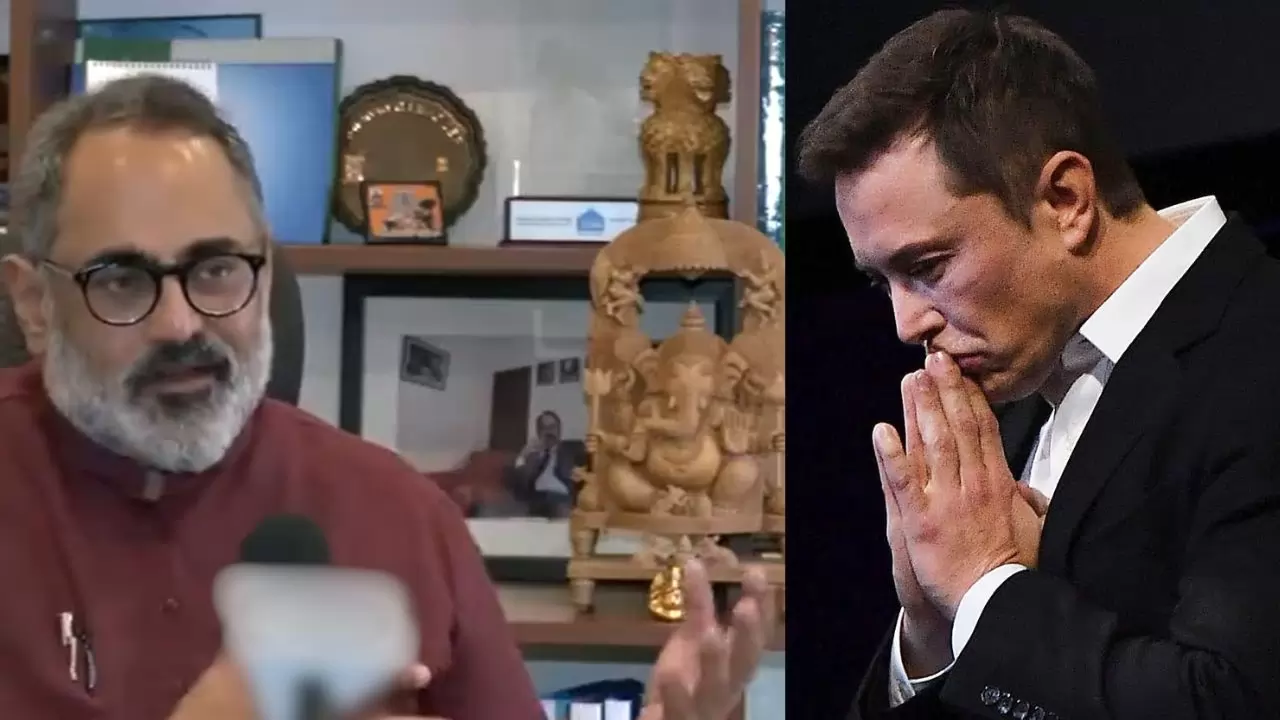
X/ANI
In a heated exchange that has captured global attention, SpaceX CEO Elon Musk and former Indian Union Minister Rajeev Chandrasekhar have found themselves at odds over the security of Electronic Voting Machines (EVMs). The debate, which ignited after a fiery discussion on social media, centers on the vulnerability of these machines to hacking, with Musk asserting that all EVMs are susceptible, while Chandrasekhar defends their robustness.
The security of electronic voting machines (EVMs) sparked a heated dispute with SpaceX CEO Elon Musk the day before. Former Union Minister Rajeev Chandrasekhar compared an unhackable toaster to a calculator on Monday. According to Chandrasekhar, an Indian EVM is a very restricted intelligence device; hence, it is not amenable to hacking. He clarified, "It just keeps the count and counts the vote." The BJP leader said that Musk's claim that "all EVMs can be hacked" is widely inaccurate.
#WATCH | On his interaction with Elon Musk on EVMs, BJP leader Rajeev Chandrasekhar says, "While I respect Elon Musk and what he has achieved. I think he is factually incorrect in saying that anything can be hacked. A calculator or a toaster cannot be hacked. Therefore, there is… pic.twitter.com/gn14Hjz3pc
— ANI (@ANI) June 17, 2024
On Monday, a day after the contentious debate, Rajeev Chandrasekhar shared a compelling analogy to emphasize his point. He compared an EVM to a calculator or a toaster, suggesting that these devices, much like Indian EVMs, are not sophisticated enough to be hacked. "An Indian EVM does not lend itself to being hacked because it's a very limited intelligence device. It only counts the vote and stores the count," Chandrasekhar explained. He contended that Musk's assertion that "all EVMs can be hacked" is not accurate, arguing that the EVM is not the complex machine Musk envisions.
Chandrasekhar, who has a background in IT, expressed his respect for Musk's achievements but firmly disagreed with his assessment of EVMs. "I am not Elon Musk. But I also have a certain understanding of technology to claim that there cannot be any secure electronic or digital product in the world. It is just the same as saying that every Tesla car can be hacked," he remarked. Chandrasekhar believes Musk's statement stretches the limits of current technological understanding and misrepresents the nature of EVMs.
The controversy began on Sunday when Musk took to X (formerly Twitter) to express his concerns about the security of EVMs. He suggested that these machines should be eliminated due to their high risk of being hacked by humans or artificial intelligence (AI). Chandrasekhar responded by labeling Musk's comments as a "huge, sweeping generalization" without any factual basis. He even offered to provide a tutorial to Musk to demonstrate the robustness of Indian-designed EVMs. Musk's brief retort, "Anything can be hacked," kept the debate alive.
The debate also drew reactions from other political figures. Shiv Sena (Shinde) MP Milind Deora criticized Musk for interfering in India's democratic processes. In a post on X, Deora expressed his admiration for Musk as an innovator but opposed Silicon Valley billionaires meddling in India's democracy. To further the discussion, Deora sought the opinion of ChatGPT, an AI chatbot co-founded and funded by Musk.
Deora asked ChatGPT, "Do India’s EVMs use a SIM card?" The chatbot's response clarified, "No, India’s Electronic Voting Machines (EVMs) do not use SIM cards. They are standalone devices that are not connected to any network, making them immune to remote hacking. The design and functionality of EVMs ensure that they operate independently without the need for any external connectivity, which enhances their security and reliability in conducting elections."
I’m a fan of @elonmusk as an innovator, but not of Silicon Valley’s #BigTech billionaires meddling in India’s democracy.
— Milind Deora | मिलिंद देवरा ☮️ (@milinddeora) June 16, 2024
Still, I asked #ChatGPT—co-founded & funded by Musk—about EVMs. Here’s their take… pic.twitter.com/JgAaAWLkAw
As the debate continues, the security of EVMs remains a contentious issue, with significant implications for electoral processes worldwide. While Chandrasekhar and Deora defend the integrity and security of Indian EVMs, Musk's concerns highlight the broader apprehensions about the vulnerability of electronic systems in an increasingly digital age. The conversation around EVM security is likely to persist, reflecting the ongoing tension between technological advancement and the need for secure, reliable electoral systems.





Copyright © 2026 Top Indian News
